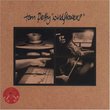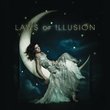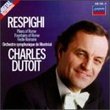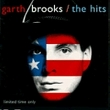| All Artists: Franz Liszt, Kiril Kondrashin, London Symphony Orchestra, Sviatoslav Richter Title: Liszt: The Two Piano Concertos; The Piano Sonata Members Wishing: 2 Total Copies: 0 Label: Philips Release Date: 7/18/1995 Genre: Classical Styles: Forms & Genres, Concertos, Sonatas, Historical Periods, Modern, 20th, & 21st Century, Romantic (c.1820-1910), Instruments, Keyboard Number of Discs: 1 SwapaCD Credits: 1 UPC: 028944620023 |
Search - Franz Liszt, Kiril Kondrashin, London Symphony Orchestra :: Liszt: The Two Piano Concertos; The Piano Sonata
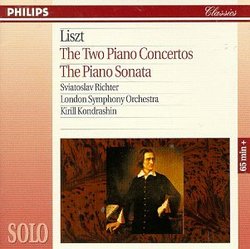 | Franz Liszt, Kiril Kondrashin, London Symphony Orchestra Liszt: The Two Piano Concertos; The Piano Sonata Genre: Classical
Since they were first issued, Sviatoslov Richter's Liszt Piano Concertos have been widely admired as the finest performances available, and for most listeners they still are. Now they have been remastered by none other ... more » |
Larger Image |
CD DetailsSynopsis
Amazon.com Since they were first issued, Sviatoslov Richter's Liszt Piano Concertos have been widely admired as the finest performances available, and for most listeners they still are. Now they have been remastered by none other than Wilma Cozart Fine, Mercury Living Presence's goddess of the sound console, and they have come up sounding better than ever. To make matters even more exciting, you also get Richter's well-nigh definitive performance of the massive Sonata in B Minor--and all for only mid-price! Even if you hate Liszt, hate concertos, hate pianos, hate Russians, hate music in general, you should own and treasure (or punish yourself regularly) with this recording. --David Hurwitz Similarly Requested CDs
|
CD ReviewsConsummate Mastery In The Liszt Concertos Jeffrey Lipscomb | Sacramento, CA United States | 04/24/2005 (5 out of 5 stars) "If you are new to the late Russian pianist Sviatoslav Richter, arguably the greatest all-round keyboard virtuoso of the last century, this is a splendid place to start. And if you are new to Liszt's piano concertos, there is little need to look any farther. Few "legendary" recordings live up to the praise heaped upon them so deservedly as these classic 1961 studio recordings. Richter's inspired blend of drama and poetry is matched by a superb accompaniment from Kondrashin and the London Symphony. Philips here has actually improved on the sound of the original LPs: only a trace of hiss betrays the fact that these performances were taped over four decades ago. However, for Richter collectors, the situation is a little more complicated. These concertos are sensibly coupled with a "live" 1966 concert reading (from Livorno) of Liszt's Piano Sonata. Recently, Philips has re-issued these same concertos (minus the Liszt Sonata) in a coupling with three Beethoven sonatas (#10, 19 & 20). The sound on the newer disc is SLIGHTLY better than what is heard on this less expensive CD. Of course, Richter completists will want to have both. Further complicating the situation, BBC Legends has issued the "live" 1961 Richter/Kondrashin concerto accounts (Royal Albert Hall, London) that preceded these studio recordings. While I generally prefer the "spontaneity" of actual concert performances, I think the studio accounts here are a little better realized and have superior sound. But again, the compleat Richterphile will need to own both: the BBC CD also has a "live" Liszt Hungarian Fantasia and Chopin's "Andante Spianato & Grande Polonaise." The Chopin is a personal favorite, along with the Czerny-Stefanska/Smetacek version on Supraphon (see my review). So, in short, I own both Philips releases as well as the BBC concert CD. That brings us back to the Liszt Sonata, which Richter never recorded in the studio. This 1966 account is one of four "live" recordings by Richter (all of which have some wrong notes). It's superior to the 1965 Aldeburgh (Classica d'Oro), which is very messy and rushed, and about on a par with the 1965 Moscow (Brilliant Classics). All in all, it's a rather analytical reading, and I would rank it just behind historic recordings by Simon Barere (mine's on Turnabout LP) and Ernst Levy (on a wonderful Marston CD that includes a great account of Beethoven's "Hammerklavier" Sonata). Unfortunately, Richter's GREATEST account of the Liszt Sonata is the only one that is currently un-available: a stupendously well-controlled, supremely poetic 18 May 1965 concert performance from Carnegie Hall. This was first issued on a rare LP (Private Edition P-101, apparently the only record issued by that label). I bought a copy in Manhattan back around 1974 for $20 - a princely sum in those days for a sole LP (adjusted for inflation, it's likely the most I have ever paid for a single disc). It also included the most awesomely well-played Mendelssohn "Variations Serieuses" I have ever heard (22 April 1965, Brooklyn), plus Richter's finest version of Beethoven's Op. 101 Sonata (3 May 1965, Carnegie Hall). This stunning Liszt Sonata was briefly available on a "Legendary Pianists" CD (Philips 422137, now deleted). So, to summarize: 1) This Philips disc contains the greatest studio accounts of Liszt's piano concertos known to me, 2) You may want to supplement it with Richter's "live" BBC accounts, and 3) Hopefully, Philips will re-issue that fabulous "live" 1965 Liszt Sonata from Carnegie Hall. The latter is the greatest account of the Liszt Sonata I have ever heard, and just possibly Richter's greatest-ever recording, period. Philips, are you listening? [Nov. 2005 update: the 1965 Carnegie Hall reading of the Liszt Sonata has recently been re-issued on a Palexa CD, which is available here at Amazon] Highly recommended. " Richter in Top Form Playing Liszt Concertos and Sonata Michael A Pahre | Cambridge, MA | 05/20/2000 (5 out of 5 stars) "This recording of the two Liszt piano concertos and the B-minor piano sonata show pianist Sviatoslav Richter with total mastery over these centerpieces of the virtuoso piano literature. The octaves are fast and wild, the bass booming but well-articulated, the upper register sparkling, and the scales evenly executed. Richter is often eccentric and sometimes sloppy, but these concerto performances are straight-forward and accessible. This recording of the concertos is as good as any in the literature, although I have a small preference for Arrau's recording with Ormandy in the 1950s.The Liszt b-minor piano sonata is possibly his most original creation, even though the work has a clear conceptual precedent in Schubert's Wanderer Fantasy. The piece follows a cyclical structure, is based on the thorough development of several basic motifs, and constantly places monumental techical demands on the performer. Richter plays throughout with daring and aggression, except for the introduction and coda, in which he nearly loses all sense of structure for the work by taking an excessively slow tempo. While this live recording of the sonata has its share of wrong notes, the energy of the performance demonstrates that Richter was at his best in concert. Once again, this is a performance nearly as good as any other, although I prefer the recordings of Cliburn, Arrau, and Argerich.The sound quality of the digital re-mastering (probably all 1960s original recordings) is excellent--particularly for the rendering of the London Symphony Orchestra, who are in surprisingly energetic and excellent form under Kondrashin's direction (despite poor intonation in a few passages). Unfortunately, the live recording itself for the sonata contains some thumping in the fugue section, which was probably a result of poor microphone placement." Two fingers to the critics. Jay | Republic of Ireland | 11/07/2002 (5 out of 5 stars) "The young Richter made his London debut with Kondrashin in these two Liszt concertos and the press reaction to them was savage. Which in my opinion, based on the recordings made of that concert was totally undeserved, although not all together surprising when one considers the political climate of 1961, so later that week when Richter and Kondrashin went to Walthamstow to make this recording, they went with a point to prove and did they prove it! Richer attacks the music from the opening bars in a way that one does not immediately associate with Liszt but which is wonderfully effective, hooking the listener and taking him along with the music. Wilma Cozart-Fine herself remastered the original three-track tapes and the sound has a terrific edge to it, though the traditionally bright Mercury "Living Presence" sound can cause problems if the replay equipment used in not up to the task, so beware. The Sonata, recorded three decades later, shows a different side to Richter, not angry this time, but relaxed both with himself and with the music, thoughtful and contemplative. Relatively speaking of course, Richter's ability to rise to the challenge of the score's more aggressive passages is never in doubt."
|

 Track Listings (11) - Disc #1
Track Listings (11) - Disc #1